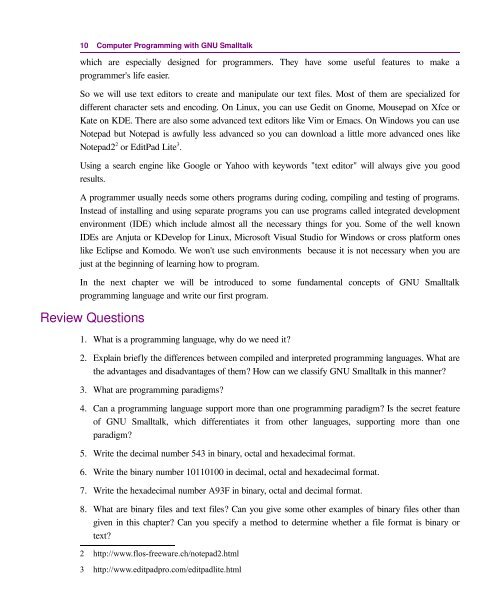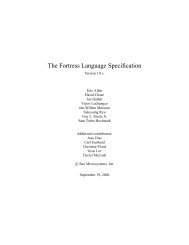Computer Programming with GNU Smalltalk - Free
Computer Programming with GNU Smalltalk - Free
Computer Programming with GNU Smalltalk - Free
You also want an ePaper? Increase the reach of your titles
YUMPU automatically turns print PDFs into web optimized ePapers that Google loves.
10 <strong>Computer</strong> <strong>Programming</strong> <strong>with</strong> <strong>GNU</strong> <strong>Smalltalk</strong><br />
which are especially designed for programmers. They have some useful features to make a<br />
programmer's life easier.<br />
So we will use text editors to create and manipulate our text files. Most of them are specialized for<br />
different character sets and encoding. On Linux, you can use Gedit on Gnome, Mousepad on Xfce or<br />
Kate on KDE. There are also some advanced text editors like Vim or Emacs. On Windows you can use<br />
Notepad but Notepad is awfully less advanced so you can download a little more advanced ones like<br />
Notepad2 2 or EditPad Lite 3 .<br />
Using a search engine like Google or Yahoo <strong>with</strong> keywords "text editor" will always give you good<br />
results.<br />
A programmer usually needs some others programs during coding, compiling and testing of programs.<br />
Instead of installing and using separate programs you can use programs called integrated development<br />
environment (IDE) which include almost all the necessary things for you. Some of the well known<br />
IDEs are Anjuta or KDevelop for Linux, Microsoft Visual Studio for Windows or cross platform ones<br />
like Eclipse and Komodo. We won't use such environments because it is not necessary when you are<br />
just at the beginning of learning how to program.<br />
In the next chapter we will be introduced to some fundamental concepts of <strong>GNU</strong> <strong>Smalltalk</strong><br />
programming language and write our first program.<br />
Review Questions<br />
1. What is a programming language, why do we need it?<br />
2. Explain briefly the differences between compiled and interpreted programming languages. What are<br />
the advantages and disadvantages of them? How can we classify <strong>GNU</strong> <strong>Smalltalk</strong> in this manner?<br />
3. What are programming paradigms?<br />
4. Can a programming language support more than one programming paradigm? Is the secret feature<br />
of <strong>GNU</strong> <strong>Smalltalk</strong>, which differentiates it from other languages, supporting more than one<br />
paradigm?<br />
5. Write the decimal number 543 in binary, octal and hexadecimal format.<br />
6. Write the binary number 10110100 in decimal, octal and hexadecimal format.<br />
7. Write the hexadecimal number A93F in binary, octal and decimal format.<br />
8. What are binary files and text files? Can you give some other examples of binary files other than<br />
given in this chapter? Can you specify a method to determine whether a file format is binary or<br />
text?<br />
2 http://www.flos-freeware.ch/notepad2.html<br />
3 http://www.editpadpro.com/editpadlite.html

















